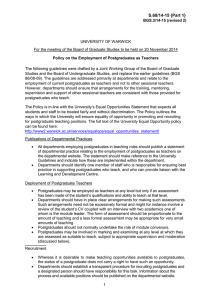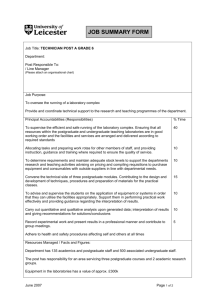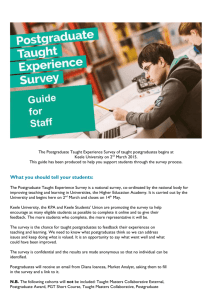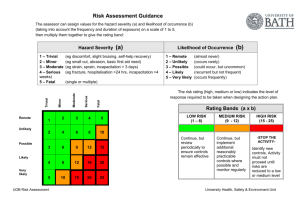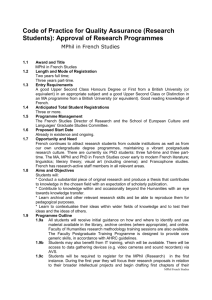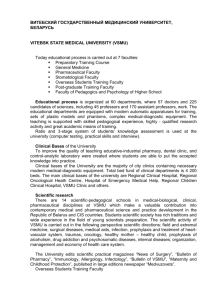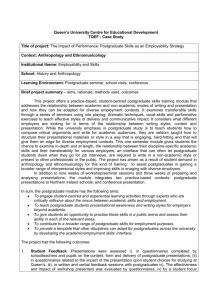UNIVERSITY OF WARWICK Policy on the Engaging of Postgraduates as Teachers
advertisement
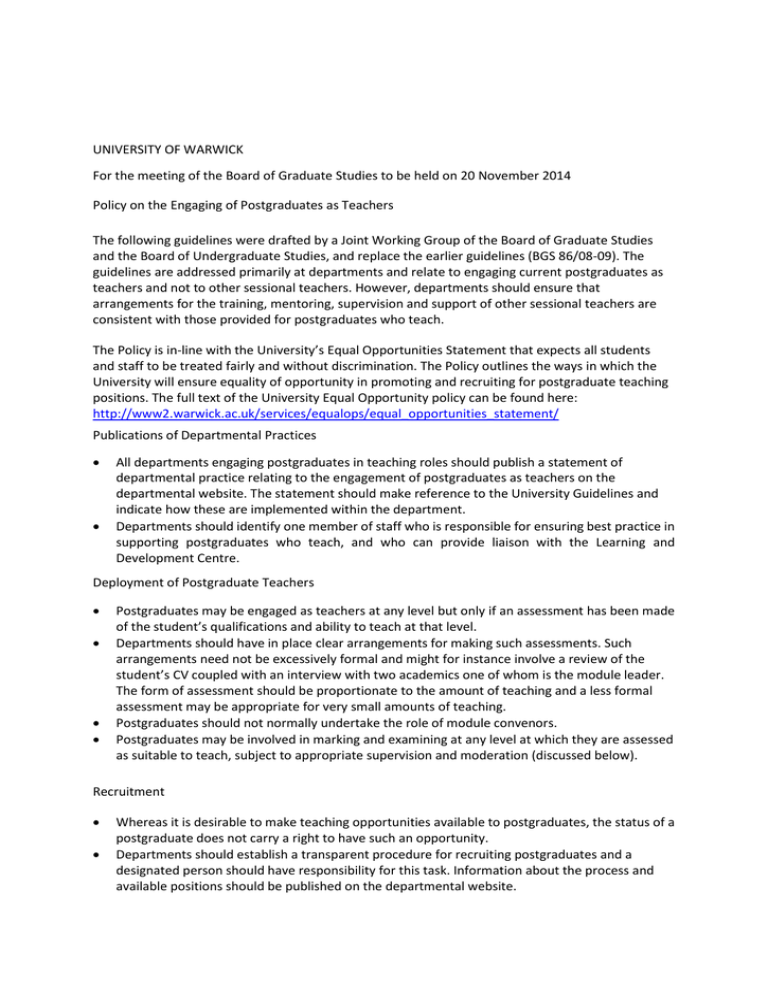
UNIVERSITY OF WARWICK For the meeting of the Board of Graduate Studies to be held on 20 November 2014 Policy on the Engaging of Postgraduates as Teachers The following guidelines were drafted by a Joint Working Group of the Board of Graduate Studies and the Board of Undergraduate Studies, and replace the earlier guidelines (BGS 86/08-09). The guidelines are addressed primarily at departments and relate to engaging current postgraduates as teachers and not to other sessional teachers. However, departments should ensure that arrangements for the training, mentoring, supervision and support of other sessional teachers are consistent with those provided for postgraduates who teach. The Policy is in-line with the University’s Equal Opportunities Statement that expects all students and staff to be treated fairly and without discrimination. The Policy outlines the ways in which the University will ensure equality of opportunity in promoting and recruiting for postgraduate teaching positions. The full text of the University Equal Opportunity policy can be found here: http://www2.warwick.ac.uk/services/equalops/equal_opportunities_statement/ Publications of Departmental Practices All departments engaging postgraduates in teaching roles should publish a statement of departmental practice relating to the engagement of postgraduates as teachers on the departmental website. The statement should make reference to the University Guidelines and indicate how these are implemented within the department. Departments should identify one member of staff who is responsible for ensuring best practice in supporting postgraduates who teach, and who can provide liaison with the Learning and Development Centre. Deployment of Postgraduate Teachers Postgraduates may be engaged as teachers at any level but only if an assessment has been made of the student’s qualifications and ability to teach at that level. Departments should have in place clear arrangements for making such assessments. Such arrangements need not be excessively formal and might for instance involve a review of the student’s CV coupled with an interview with two academics one of whom is the module leader. The form of assessment should be proportionate to the amount of teaching and a less formal assessment may be appropriate for very small amounts of teaching. Postgraduates should not normally undertake the role of module convenors. Postgraduates may be involved in marking and examining at any level at which they are assessed as suitable to teach, subject to appropriate supervision and moderation (discussed below). Recruitment Whereas it is desirable to make teaching opportunities available to postgraduates, the status of a postgraduate does not carry a right to have such an opportunity. Departments should establish a transparent procedure for recruiting postgraduates and a designated person should have responsibility for this task. Information about the process and available positions should be published on the departmental website. Normally, recruitment should be on the basis of a person specification setting out required qualifications, skills and competences (to include in all cases skills in language and communication, and appropriate training). Less formal recruitment procedures may be appropriate for small amounts of teaching. Training All postgraduates engaged to teach should undertake prior training. Training may be by attending the Introduction to Academic Professional Practice course delivered centrally or provided by the department. Prior training and experience may be taken into account in assessing whether a candidate has received suitable training. Departments are encouraged to establish tailored training for their postgraduates and other parttime teachers. As part of their training, all postgraduate teachers should be briefed by the department about relevant departmental teaching practices prior to starting to teach. Workloads and Duties A postgraduate should be offered teaching only if the department judges that it would be possible to perform the work whilst continuing to make reasonable progress with their studies and without detriment to the student’s ability to submit their dissertation within the normal period of registration. In determining the amount of teaching that a postgraduate may be asked to perform, a department should take into account the expectation that a full-time postgraduate student will devote 1800 hours per year to their studies. Departments must take account of the requirements of external funding bodies and any visa implications when allocating teaching to postgraduates. When a postgraduate is engaged to teach, it should be made clear at the outset exactly what is expected in terms of class contact, preparation, consultation hours with students, marking or other assessment, feedback, attendance at meetings and invigilation. Departments should make clear what duties are covered by the remuneration to be offered to PGs who teach. Mentoring, Supervision and Support Each postgraduate teacher should have access to a teaching mentor, who may be the Director of Undergraduate Studies or another member of academic staff. They will be able to advise on teaching issues, to discuss problems and to provide feedback as appropriate. Heads of Department should recognize the role of the teaching mentor in appropriate ways. All postgraduate teachers should have separate support and supervision linked to their specific teaching role, normally by the module leader or module lecturer. As part of the ongoing support provided by the academic department, postgraduates who teach should be adequately briefed as to the expectations of their role Postgraduates who undertake marking must be briefed on assessment methods, marks scales and descriptors, the criteria to be applied and marking standards. Where a postgraduate undertakes marking of summative assignments for which moderation is required, the moderation should be carried out by a permanent member of staff or equivalent. Normally, second marking should take place where a postgraduate is inexperienced but other forms of moderation may be used where the postgraduate has gained relevant experience and has been assessed as competent. Marking of formative assessments should be subject to supervision but need not be subject to formal second marking or moderation. Postgraduates who teach should be invited to give feedback to their departments about the quality and effectiveness of the training, supervision and support which they receive. Departments should ensure that postgraduates who teach have opportunities to observe more experienced teachers and are made aware of, and able to take up, further training opportunities available through the Learning Development Centre. Review The performance of postgraduate teachers should be monitored by module leaders and the teaching mentor using student feedback and other mechanisms which might include teaching observation. Renewal of a teaching appointment should be subject to an informed judgement that teaching has been satisfactory and there should be no presumption that appointments will be renewed. Departments must have mechanisms to appropriately investigate and act upon concerns raised by students and/or mentors about the quality of teaching by post- graduate teachers, including provision to replace teaching if the situation is deemed to merit such action. Engagement with the Academic and Teaching Community Postgraduates who teach should be respected as members of the teaching community and should have access to the facilities and resources necessary to fulfil their role The University encourages students to engage with teaching and learning development events facilitated by the LDC and others, as well as, where appropriate participating in departmental forums regarding teaching. Departments and the University should ensure that postgraduates who teach have opportunities to share good practice, discuss matters of common interest and voice common concerns. *Subject to final ratification
